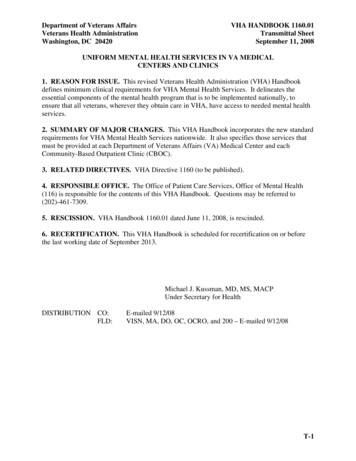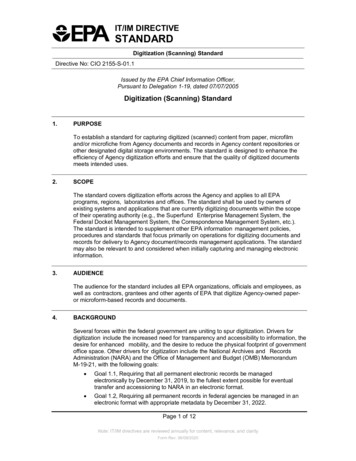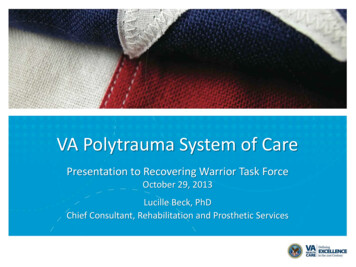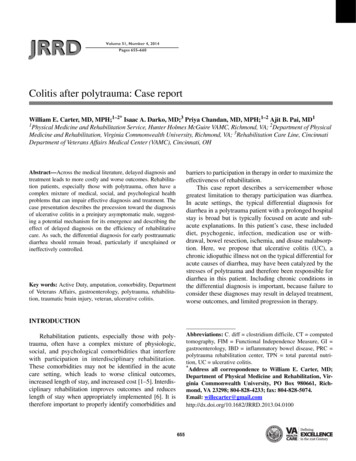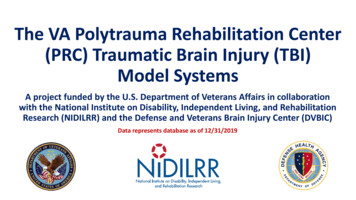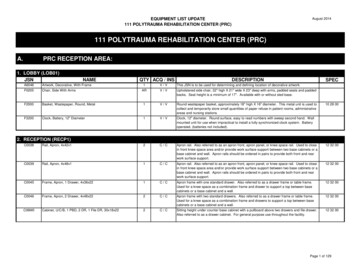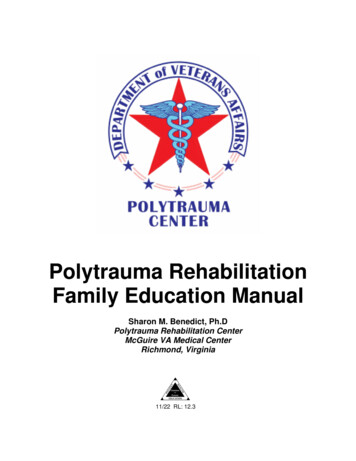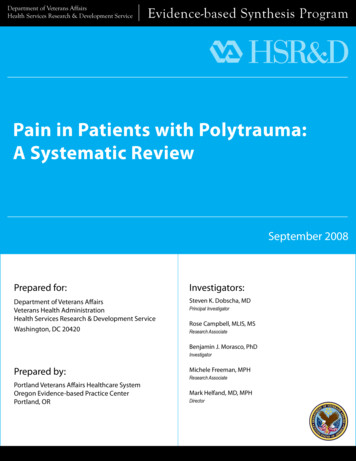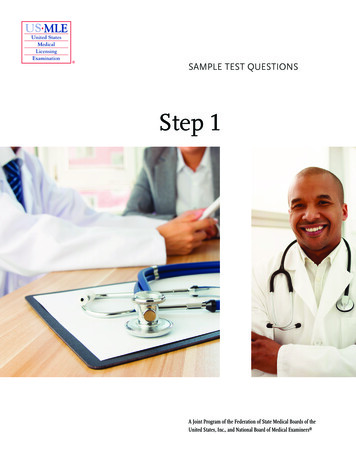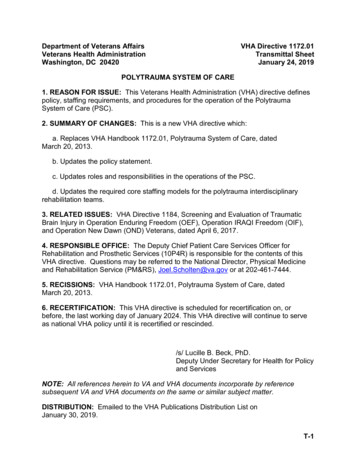
Transcription
Department of Veterans AffairsVeterans Health AdministrationWashington, DC 20420VHA Directive 1172.01Transmittal SheetJanuary 24, 2019POLYTRAUMA SYSTEM OF CARE1. REASON FOR ISSUE: This Veterans Health Administration (VHA) directive definespolicy, staffing requirements, and procedures for the operation of the PolytraumaSystem of Care (PSC).2. SUMMARY OF CHANGES: This is a new VHA directive which:a. Replaces VHA Handbook 1172.01, Polytrauma System of Care, datedMarch 20, 2013.b. Updates the policy statement.c. Updates roles and responsibilities in the operations of the PSC.d. Updates the required core staffing models for the polytrauma interdisciplinaryrehabilitation teams.3. RELATED ISSUES: VHA Directive 1184, Screening and Evaluation of TraumaticBrain Injury in Operation Enduring Freedom (OEF), Operation IRAQI Freedom (OIF),and Operation New Dawn (OND) Veterans, dated April 6, 2017.4. RESPONSIBLE OFFICE: The Deputy Chief Patient Care Services Officer forRehabilitation and Prosthetic Services (10P4R) is responsible for the contents of thisVHA directive. Questions may be referred to the National Director, Physical Medicineand Rehabilitation Service (PM&RS), Joel.Scholten@va.gov or at 202-461-7444.5. RECISSIONS: VHA Handbook 1172.01, Polytrauma System of Care, datedMarch 20, 2013.6. RECERTIFICATION: This VHA directive is scheduled for recertification on, orbefore, the last working day of January 2024. This VHA directive will continue to serveas national VHA policy until it is recertified or rescinded./s/ Lucille B. Beck, PhD.Deputy Under Secretary for Health for Policyand ServicesNOTE: All references herein to VA and VHA documents incorporate by referencesubsequent VA and VHA documents on the same or similar subject matter.DISTRIBUTION: Emailed to the VHA Publications Distribution List onJanuary 30, 2019.T-1
January 24,2019VHA DIRECTIVE 1172.01CONTENTSPOLYTRAUMA SYSTEM OF CARE1. PURPOSE . 12. BACKGROUND. 13. DEFINITIONS . 14. POLYTRAUMA SYSTEM OF CARE . 25. POPULATION SERVED . 46. POLICY . 57. RESPONSIBILITIES . 58. TRAINING . 89. RECORDS MANAGEMENT . 910. REFERENCES . 9APPENDIX ACLASSIFICATION OF TBI SEVERITY.A-1APPENDIX BREHABILITATION STANDARDS IN THE POLYTRAUMA SYSTEM OF CARE .B-1APPENDIX CREQUIRED CORE STAFFING FOR THE POLYTRAUMA REHABILITATION CENTER(PRC) PER 12-BED INPATIENT UNIT . C-1APPENDIX DREQUIRED CORE STAFFING FOR POLYTRAUMA TRANSITIONALREHABILITATION PROGRAM (PTRP) PER 10-BED INPATIENT UNIT. D-1APPENDIX EREQUIRED CORE STAFFING FOR POLYTRAUMA NETWORK SITES (PNS) .E-1APPENDIX FREQUIRED CORE STAFFING FOR THE POLYTRAUMA SUPPORT CLINIC TEAMi
January 24,2019VHA DIRECTIVE 1172.01(PSCT)* . F-1APPENDIX GREPORTING REQUIREMENTS IN POLYTRUAMA SYSTEM OF CARE . G-1APPENDIX HDECISION SUPPORT SYSTEM IDENTIFIERS (CLINIC STOP CODES) . H-1ii
January 24,2019VHA DIRECTIVE 1172.01POLYTRAUMA SYSTEM OF CARE1. PURPOSEThis Veterans Health Administration (VHA) directive establishes policy for theoperation of the Polytrauma System of Care (PSC) organized under Physical Medicineand Rehabilitation Service (PM&RS) Program Office within VHA’s Office ofRehabilitation and Prosthetic Services. AUTHORITY: Title 38 United States Code(U.S.C.) 1710C, 1710D, 1710E, 7327, 8111, 8153.2. BACKGROUNDa. VHA’s PSC is a nationwide integrated network of 124 specialized programs forthe treatment and rehabilitation of Veterans and Servicemembers with polytrauma andtraumatic brain injury (TBI). VHA has a long and distinguished tradition of providingrehabilitation care for Veterans with disabilities. Yet, the complex medical,rehabilitation, and psychosocial needs of a new generation of Veterans andServicemembers with combat and non-combat associated injuries from OperationEnduring Freedom (OEF), Operation Iraqi Freedom (OIF), and Operation New Dawn(OND) brought to the forefront the need for a continuum of integrated specializedclinical and support services.b. Title 38 U.S.C. 7327, Centers for research, education, and clinical activities oncomplex multi-trauma, led to the establishment of VHA’s PSC beginning in 2005. Sincethen, PSC has grown through a coordinated effort to improve clinical care, clinicianeducation and training, research, and collaborations with the Department of Defense,academic partners and private industry. As with other health conditions frequentlyoccurring in Veterans, VA is leading the way in studying, developing, and implementingreal-world solutions that benefit Veterans with TBI and polytrauma today and in thefuture.3. DEFINITIONSa. Polytrauma. Polytrauma is defined as two or more injuries sustained in the sameincident, one of which may be life threatening, which affect multiple body parts andorgan systems and result in physical, cognitive, emotional, and behavioral impairmentsand functional disabilities. TBI frequently occurs in polytrauma in combination withother disabling conditions, such as: traumatic amputations, open wounds,musculoskeletal injuries, burns, pain, auditory and visual impairments, post-traumaticstress disorder (PTSD), and other mental health problems. When present, injury to thebrain often leads the course of rehabilitation due to the complexity of the relatedcognitive, emotional, and behavioral deficits.b. Traumatic Brain Injury.(1) Traumatic Brain Injury (TBI) is defined as a traumatically induced structural injuryand/or physiological disruption of brain function as a result of an external force and is1
January 24,2019VHA DIRECTIVE 1172.01indicated by new onset or worsening of at least one of the following clinical signsimmediately following the event.(a) Any period of loss of or a decreased level of, consciousness;(b) Any loss of memory for events immediately before or after the injury (posttraumatic amnesia);(c) Any alteration of mental state at the time of the injury (for example, confusion,disorientation, slowed thinking, alteration of consciousness/mental state);(d) Neurological deficits (for example, weakness, loss of balance, change in vision,praxis, paresis/plegia, sensory loss, aphasia) that may or may not be transient; and(e) Intracranial lesion.(2) The above criteria define the event of TBI. Not all individuals exposed to anexternal force to the head will sustain a TBI, but any person who has a history of suchan event with immediate manifestations of any of the above signs and symptoms can besaid to have had a TBI.(3) TBI severity is divided into mild, moderate, and severe, based on the length ofLoss of Consciousness (LOC) or Alteration of Consciousness (AOC), duration of PostTraumatic Amnesia (PTA), and the Glasgow Coma Scale (GCS) results. The majorityof TBIs are mild (mTBI), also known as concussion. All penetrating brain injuries areconsidered severe (see appendix A: Classification of TBI Severity).c. Blast Injuries. Exposure to blasts or explosions is a frequent cause of combatinjuries and polytrauma. The mechanisms of blasts that contribute to injuries are theover-pressurization wave, the impact of blast-energized debris, being physically throwninto environmental hazards, and inhalation of gases and vapors.4. POLYTRAUMA SYSTEM OF CAREa. VHA’s PSC delivers world-class medical and rehabilitation services for Veteransand Servicemembers with TBI and associated polytrauma. Through this program, VHAcontinues to advance the diagnosis, evaluation, treatment, and understanding of TBI ina variety of ways, including but not limited to:(1) Establishing standardized diagnostic and assessment protocols;(2) Developing and implementing best clinical practices for care;(3) Educating and training clinicians in TBI-related care and rehabilitation;(4) Collaborating with strategic partners; and2
January 24,2019VHA DIRECTIVE 1172.01(5) Conducting, interpreting, and translating research findings into improved patientcare and caregiver support.b. PSC balances access and expertise to provide specialized polytrauma and TBIcare at locations across VA medical centers. Services are organized into four levels ofcare spanning from regional referral centers, to network sites, to local VA medicalfacilities (see paragraphs 10.g. and 10.h. for PSC program descriptions, locations, ) Polytrauma Rehabilitation Center (PRC). PSC has five PRCs located at theHunter Holmes McGuire Hospital in Richmond, VA; James A. Haley Veterans’ Hospitalin Tampa, FL; Audie L. Murphy Memorial Veterans’ Hospital in San Antonio, TX; PaloAlto VA Medical Centre in Palo Alto, CA; and Minneapolis VA Medical Center inMinneapolis, MN. The PRCs serve as regional referral centers for comprehensiveacute inpatient rehabilitation. A dedicated staff of specialized rehabilitationprofessionals and consultants is available to address complex and severe TBI andassociated polytrauma. The PRCs function as resources for consultations and carecoordination in their regions. Their staff participates in the development of clinicalguidance and best practices, and integration of research activity and findings into thecare system through education and training. The PRCs are accredited by theCommission on Accreditation of Rehabilitation Facilities (CARF) using Brain InjurySpecialty standards (see paragraphs 7.f. (3) and 10.j.).(2) Polytrauma Network Site (PNS). One or two PNSs are distributed in eachVeterans Integrated Service Networks (VISN). Rehabilitation care at the PNSs focuseson outpatient services, but inpatient bed units are also available to address post-acuteand chronic complications. PNSs maintain a full complement of rehabilitationprofessionals on staff to address complex TBI and polytrauma-related symptoms andfunctional deficits. PNS staff provide clinical oversight of the PSC programs within theirVISN including care coordination, managing referrals and consultations, and advisingon the collection and reporting of data (see paragraphs 7.g. and 7.h.). The inpatientrehabilitation bed units at the PNSs maintain CARF accreditation for ComprehensiveIntegrated Inpatient Rehabilitation (see paragraphs 7.f.(3) and 10.j.).(3) Polytrauma Support Clinic Team (PSCT). The PSCTs provide outpatientinterdisciplinary rehabilitation services that include comprehensive evaluations anddevelopment of individualized rehabilitation plans of care.(4) Polytrauma Point of Contact (PPOC). The PPOCs deliver a more limitedrange of outpatient rehabilitation services for TBI and polytrauma-related problems. Forclinical cases that exceed local expertise, the PPOC works with the PNS in their VISNfor consultations and service delivery using telehealth solutions.c. Polytrauma Transitional Rehabilitation Program (PTRP). Five residentialPTRPs are currently in operation at the PRCs. PTRPs provide inpatient rehabilitationservices in a residential type environment for individuals who benefit from physical,3
January 24,2019VHA DIRECTIVE 1172.01cognitive, communicative, behavioral, and psychosocial therapies to facilitate return tohome, school, work, or military service after significant injury or illness. Therapyservices are provided by interdisciplinary teams of rehabilitation specialists using acombination of group and individual formats. Services address a broad range ofvocational, leisure, and spiritual needs with focus on community reintegration goals.Family and caregiver are encouraged to participate in all phases of the rehabilitationprocess whenever appropriate and practicable. The PTRPs are CARF accredited forresidential rehabilitation with brain injury specialty programming.d. Emerging Consciousness (EC) Program. Nationally-recognized rehabilitationspecialists from VA developed the EC program in collaboration with experts from theacademic community and the private sector. The EC program is a highly-specializedprotocol for the rehabilitation of the Veterans and Servicemembers who are slow torecover consciousness after severe injuries. The goal of the program is to deliver theright balance of medical and therapeutic interventions to improve responsiveness andreturn to consciousness, to minimize complications, and to facilitate progress towardsthe next level of rehabilitation care. The EC Program is part of the continuum ofrehabilitation services offered at the 5 PRCs.e. Assistive Technology (AT) Lab. The AT Labs at the 5 PRCs provide servicesdirectly to Veterans and Servicemembers and serve as expert resources to support theapplication of AT across VHA. The AT Labs are responsible for evaluation,development, and implementation of appropriate AT services, strategies, devices,and/or practices to improve the functional challenges faced by Veterans andServicemembers in their daily life roles. Types of devices prescribed may includeadapted automotive equipment, adapted sports and recreation equipment, aids for dailyliving, wheelchairs, and communication aids. When necessary, the AT specialists havethe skills and equipment to modify or design devices that serve specific needs ofVeterans. The AT teams include rehabilitation engineers and other rehabilitationproviders with specialized AT expertise.5. POPULATION SERVEDa. VHA's PSC provides a full range of rehabilitation services for eligible Veterans,and Active Duty Servicemembers covered by Defense Health Agency Great Lakes(DHA-GL) or TRICARE authorization, who sustained polytrauma and TBI. This includespersons with:(1) TBI (whether deployment related or not);(2) Blast and non-blast related traumatic injuries including but not limited toamputations, musculoskeletal injuries, open wounds;(3) Other acquired brain injuries including, but not limited to, stroke, brain tumors,infection, poisoning, hypoxia, ischemia, encephalopathy, or substance abuse, asappropriate for specific cases;4
January 24,2019VHA DIRECTIVE 1172.01(4) Physical, cognitive, emotional, and behavioral impairments related to the braininjury;(5) Impairments that are clinically and functionally significant and lead to activity andparticipation restrictions; and(6) Potential to benefit from the specialized rehabilitation services provided by thePSC.6. POLICYIt is VHA policy that eligible Veterans and Servicemembers with TBI and polytraumahave access to all medical and rehabilitation services provided through the PolytraumaSystem of Care as clinically indicated.7. RESPONSIBILITIESa. Under Secretary for Health. The Under Secretary for Health is responsible forensuring VHA compliance with this directive.b. Deputy Under Secretary for Health for Operations and Management. TheDeputy Under Secretary of Health for Operations and Management is responsible for:(1) Communicating the contents of this directive to each of the VISN Directors.(2) Ensuring that each VISN Director has the resources required to support thefulfillment of the terms of this directive in all VA medical facilities with PSC programswithin that VISN.(3) Providing oversight of VISNs to assure compliance with this directive.c. Deputy Chief Patient Care Services Officer for Rehabilitation and ProstheticServices. The Deputy Chief Patient Care Services Officer for Rehabilitation andProsthetic Services is responsible for:(1) Ensuring support and resources for successful implementation of the PSCconsistent with this directive.(2) Reviewing proposed changes to PSC with the National Director, PM&RS, andapproving proposed changes.(3) Communicating programmatic changes to PSC to the Deputy Under Secretaryfor Health for Policy and Services.d. National Director, Physical Medicine and Rehabilitation Service. TheNational Director, Physical Medicine & Rehabilitation Service, is responsible for;(1) Ensuring development and maintenance of policy and the rehabilitationstandards of care for PSC (see appendix B).5
January 24,2019VHA DIRECTIVE 1172.01(2) Providing operational consultation and policy guidance to VISNs and VA medicalfacilities for the development and operation of PSC services.(3) Developing program evaluation procedures and monitoring performance on aquarterly basis in collaboration with VISN and medical center leadership. Priorityperformance metrics are consolidated into a dashboard (see appendices G and H).(a) Reviewing all PSC program change requests and providing consultation andrecommendations to program, VA medical facility, VISN, and VHA leadership.(b) Responding to inquiries from internal and external stakeholders about PSCoperations and services.e. Veterans Integrated Service Network (VISN) Director. Each VISN Director isresponsible for:(1) Ensuring that PSC services are accessible to eligible Veterans and Active DutyServicemembers covered by DHA-GL or TRICARE authorization. The entire continuumof care and clinical services may not be present in a single VA medical facility, but mustbe available to all Veterans treated within a VISN. NOTE: Some components of thecontinuum may be provided in coordination with neighboring VISNs.(2) Ensuring that programs are operated in compliance with this VHA directive.(3) Ensuring appropriate staffing levels according to appendices C, D, E, and F.f. VA Medical Facility Director. Each VA medical facility Director is responsible for:(1) Ensuring that VA medical facilities have the necessary staff and resources tosupport specialized PSC program operations (see appendices C, D, E, and F for theRequired Core Staffing for the PSC components).(2) Providing and maintaining oversight of the PSC program(s) within theirrespective VA medical facility to ensure access, quality services, and compliance withthis VHA policy.(3) Ensuring that PRC and PNS programs achieve and maintain CARF accreditationunder standards appropriate for the level and types of care provided.(4) Providing safe, well-maintained, and appropriately-furnished facilities that supportand enhance the recovery efforts of Veterans being treated for polytrauma and TBI.(5) Ensuring the timely completion of all mandated reporting, monitoring, and otherrequirements of the PSC programs as communicated to facilities and network directorsthrough the office of the Deputy Under Secretary for Health for Operations andManagement.6
January 24,2019VHA DIRECTIVE 1172.01g. PSC Program Medical Director. Each PSC Program Medical Director isresponsible for:(1) Serving as clinical leader for TBI and polytrauma rehabilitation care andfunctioning as the subject matter expert at the regional (PRC and PTRP MedicalDirectors), VISN (PNS Medical Director) and local facility levels (PSCT MedicalDirector).(2) Collaborating with other VA, governmental, state, academic and private entitieswithin the region, VISN, and facility, to ensure that appropriate services are available forVeterans and Servicemembers with TBI
Jan 24, 2019 · Rehabilitation and Prosthetic Services (10P4R) is responsible for the contents of this VHA directive. Quest
